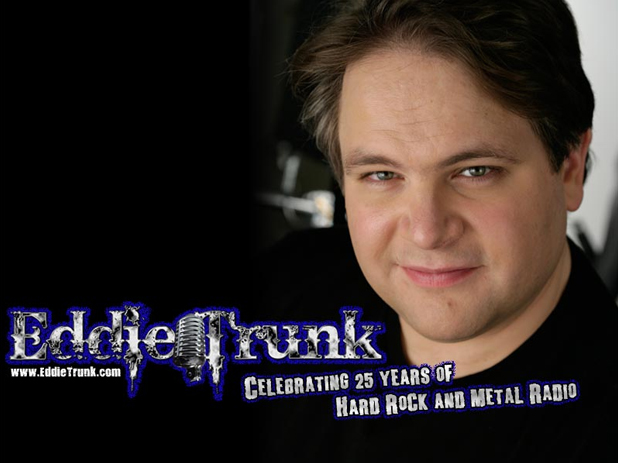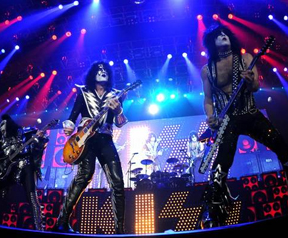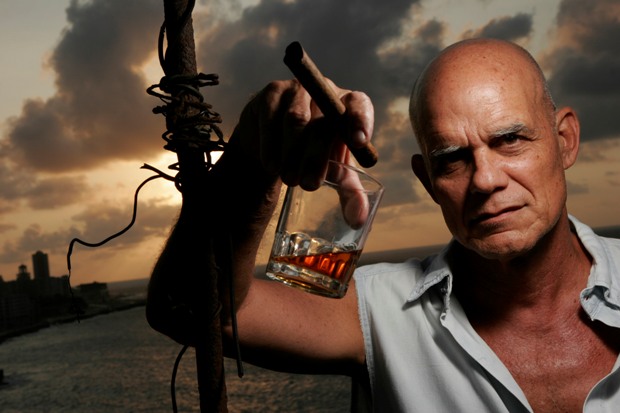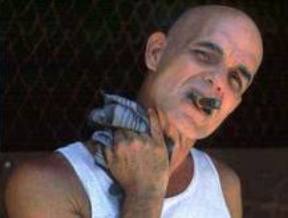We have the good luck to meet him in the
offices of his Finnish publishing house, few minutes before flying back to his
home in the Swedish Artic Pole. A trip of 10 hours leading him to his village
of only 2000 citizens not far from the
Finnish border: Pajala. Mikael has spent the week end in Helsinki promoting his
new book: The man who died like a salmon
(Mies joku kuolli kuin lohi), and
feels surprise about how the author of this interview, coming from a southern
warmer country, can live in Finland’s capital. I wonder the same about his life
in such a remote place as Pajala is.
“I am a typical northern person, so my
mentality is from the north. I was growing up there, my father is from Pajala
and my people too. We have our minority there, we speak Finnish , my surname is
Finnish “Niemi”, my father first language was this typical Meänkieli, different
from the Finnish spoken in Finland,
but still related, and it is about my roots. I love to be there. I love skiing
for example. I do 1000 kilometres in total during the winter and of course, and
then I also write. I have my family there, I have 3 kids, and I like that they
are growing up in my own culture, and I think I am lucky to live there. When I
was younger I was living in Helsinki
for one year, because I had a girlfriend here. I also lived in Stockholm, but I think that Pajala is
better.”
It
must be a very beautiful place to live
I like it, but some people say that it is
too dark and too cold, but we are very warm people, to balance the situation…
{mosimage}You
have now this new book whose title in Finnish is Mies
joku kuolli kuin lohi, The man who died like a salmon. In Popular Music book, we
could find also a funny title in the Finnish version (The title literally
translated meant Popular Music from the cunt). Is it your personal choice when
choosing the titles?
Yes, I always make my own title, and it is
very important to have a good one, I started as a poet, and it is very
important that the language contains a lot of poetry. I was also a very bad
musician, I was composing my songs, so I work a lot with the titles, and I am
very satisfied with this one. I think that is poetic, but a bit brutal and
strange at the same time.
You
write your originals in Swedish. Why not in Meäkieli, the Finnish dialect
spoken in Tornionlaakso, the region where Pajala is?
Because it is not my language, it is my father’s
language. But in 1960´s, people were ashamed of using it, cause of the
oppression from the state. They were afraid of us speaking Finnish, so we would
like to have independents thoughts. It is about history, so Sweden was very
nationalistic years ago. This is the same case all around Europe,
but we never wanted a nation or our own land or belong to Finland, We
only wanted to have our own culture and feel proud of it. When I grew up, my
father never taught me Finnish. I learnt from the streets, from my friends,
from speaking when I am hunting with my friends, so I know a bit, but not too
well to write it. Meänkieli did not have a written language, and efforts
started very recently to try to write down this language. So people are
developing the grammar, or rules to spell the word.
So it
is a language under construction…
Yeah, it is under construction, and you have to make that with every word, so
it is complicated but very interesting at same time. That also means that we
have very few books written in meänkieli. Some authors are writing in
meänkieli, very few, but then you have the problem that people cannot read it,
so they are not used to see their language in letters.
Your
father spoke Meänkieli, your mum Swedish, you grandmother Sámi, and you are
married to a Dutch woman. What language do you speak at home?
At home, we have 3 children and we decided
from the start that she should speak only her language to the children. It is
not Flemish, but Frisian, a minoritarian language too in the north of Holland, so we have the
same situation in that aspect. So my children speak Frisian and Swedish, and
then we try to learn a little more of meänkieli too.
And
with your wife, do you speak English?
No, my wife speaks perfect Swedish; she is
very good in languages. My oldest son, who is 9 years old now, is very good in
languages, so he can learn now other languages like English. He goes to Holland and talks to
people there in good Frisian, so it is fantastic to see how he can speak much
better than me. This could have happened to me, I could have had fluent
knowledge of meänkieli and Swedish, but it was not allowed at that time. It was
considered to be bad.
Can
you explain us a bit more about the plot of your new book?
{quotes}It is a criminal story, so it starts with a
murder of an 89 years old man in Pajala.{/quotes} He was working in the customs when he
was younger, to guard the border between Finland and Sweden, and he
is very aggressive to the minority language. He is a symbol of the oppression,
although he belongs to the same culture as well. So he is murdered and a woman
comes from Stockholm,
a police officer called Therese Fossnes and she starts the investigation. She
cannot speak any Finnish and does not know anything about the culture. She is
watching reindeers for the first time in her life. So she is in her own
country, but it is like another world for her. I am using here the conflict of
culture collision, conflict of woman against the man “macho” strong society, and
she is a very strong woman as well. She meets a man from Pajala whom suspected
to be the murderer and then they start to get to know better, so there is love
in the story as well. The book will be translated soon to English.
What
grade of self involvement do you have in the novel?
I am much involved too. I put a lot of real
people in the book. I am using around 40 real people of Pajala in the book, and
for instance, at the beginning there is a woman who takes care of old people,
and she finds the dead body, and she is an existing person
Mikael looks for some papers and show us
pictures of real people and places in Pajala that appear in his novel.
What
is the reaction of the people when they see themselves in the story of your
book?
Well, I ask them for permission, I always
say “Do you want to be in my book?” and everybody says “yes!” I had also a
chapter about hunting, I am a hunter too. My father is in that chapter and my
hunting friends too. They appear with the real names. And everybody gets a free
copy of the book…
So at
the end, the entire village wants to appear in your book!
Yeah, some people told me “Why am I not in
the book? You should put me in the next one!
As
you said, there is not much written tradition for Meänkieli, it is coming
mostly from oral tradition and stories. So which are the sources from where you
get to hear the stories?
In our culture, in some special occasions,
people start to tell stories, and then I always listen with “big ears”. Now I m
starting to tell them myself, cause when you are getting a bit older, I am 47
now, then you start to tell stories also, about people who lived there or
special things that happened in our area. It is really wonderful, and I get a
lot of energy from that. So I tell to those people that they are authors also,
they do not write books, but they have the language, the ability to tell.
So
was your father also telling you stories?
Well, my father was a quiet man. He was
telling sometimes. He was a policeman, and actually that is also a great
motivation for me to write the police story in this new book. Sometimes he told
me about some dramatic things that happened during his police job. Many times
he told me “you must never write about this!” “It is a secret” and I always
answer, ok, I will not write about it now, but I don’t know if I can keep this
promise forever, because they were very good stories, so as a writer I feel the
need to collect them.
Are
you satisfied with the Popular Music movie version?
Yes, I like it. Of course it was much
shorter than the book, but well, some people said to me that the movie was ok,
but the book better, so I could just answer to them “Thank you!
After
the book became so popular, no bigger company made you an offer to film
something with bigger stars?
Yes, I had propositions, but I wanted the
movie to be recorded in Tornionlaakso, I wanted to be shot there, and I wanted
also to have some Finnish meänkieli there. It was important from our culture,
and the producers from other big countries like Germany or Denmark wanted it to
be shot in south Sweden or in studios, and they wanted to dub the actors, so I
preferred to do it in Pajala, and it was very good, many hundreds of people
there participated in the movie. For example, my mother was in 2 scenes, my
wife also appeared in the movie, and a lot of young people who could be actors
for first time in their lives, so it was fantastic to see that experience for
the people. {quotes}As an anecdote, when they were making the scene for the sauna
competition, they had a real sauna, and it was real hot.{/quotes} It took many hours to
film it. The director said to one Finnish actor “Could you do it like if you
were dying”, and the actor answered “I am dying!”, and he fainted, he was
really ill, and was taken from Pajala by ambulance to reanimate him. They were
going to stop the filming, but they had still one important scene to do, so the
actor came back to the sauna again. That really showed some Finnish “sisu”!.
Beatles
or Rolling Stones?
I prefer Beatles, but I also like the
Stones. We played with my band covers like Brown
Sugar. When I saw the Stones in Stockholm,
they started the concert with that song, so I felt a high feeling, like if they
were playing it especially for me.
So
are The Beatles your favourite all time band?
I would say yes, but I listen to a lot of
music. I can listen to hip hop, techno, hard rock, trash metal… I also follow
new bands, and when I have the opportunity to go to a concert, I try to see
them on live, because I love live music and rock and roll. I play also some harmonica, accordion,
guitar, piano, just for myself. But I think I am a better writer than musician
(laughs). But I love music and it is very important for me in my lifestyle. For
example, I also love Hendrix, he was a genius! In my science fiction book,
there is one part where people go to heaven, and there is a Jimi Hendrix’s gig
every night!
Do
you feel pressure when releasing a new book into the market?
I felt some pressure when I wrote a science
fiction book after Popular Music (Nahkakolo), but now it is not like that
anymore. With this new book I did not feel pressure. Writing is my hobby more
than job. I get a lot of good feelings, it is fun to sit and be many hours
writing and writing. Many people do not understand it, but I love it, it is my
life!. That is why I write, and then of course I try to publish. When Popular Music book was finished, 2 big
companies said no to the publication (it was not still a success in Sweden),
they thought that sounded very strange, and the 3rd company was Like
who took the risk. So it was not easy to publish in Finland first. But it is a good
question how you deal with expectations. I stopped to read reviews, I do not
read them anymore, because they change my mind in a bad way, and I do not want
to write for money, but for my heart. My creativity should come from my heart
and from my soul, so that is why I try not to think about money or success.
That is very easy in Pajala. They ask me how is to be famous in Pajala, and I
say that in Pajala, every one is famous, I go in the street and I talk like
them, I act like them, I go hunting like them, so I am only one more there.



